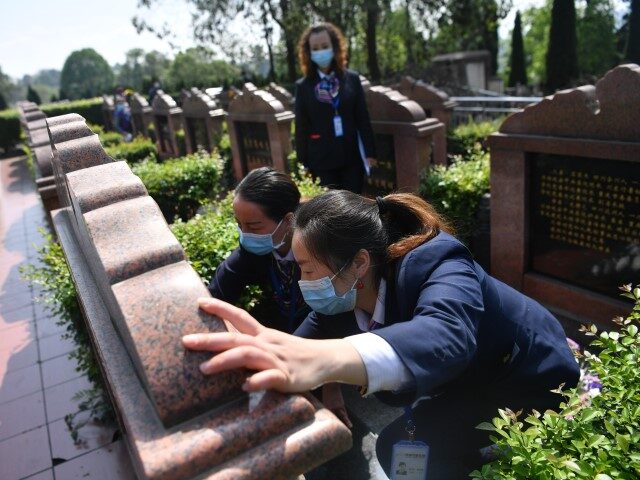The latest unsettling high-tech craze in China involves bereaved families hiring artificial intelligence (AI) firms to create audiovisual simulations of the dearly departed.
Barron’s reported on Wednesday that some Chinese mourners cobble together avatars of the dead themselves, hiring various companies to reproduce their voices and digital likenesses, while others turn to replication firms that boast of creating eerily accurate digital avatars of the dead with only a few minutes of voice recordings and a handful of photographs.
“On A.I. technology, China is in the highest class worldwide. And there are so many people in China, many with emotional needs, which gives us an advantage when it comes to market demand,” Zhang Zewei, founder of an AI company called Super Brain, said.
Zhang said his company charges up to $2,800 to create an avatar within 20 days. Some of the “ghost bots” are automated and interactive. In other cases, a Super Brain staffer can digitally alter their face and voice to appear as a lost loved one and hold a video call with grieving families.
Zhang’s company can also create avatars of people who are not dead, such as estranged spouses and children who live far away, which might prove even more controversial than creating digital clones of the dead.
Defenders of the “ghost bot” industry said they can help people deal with their grief, although the pitfall exists of people refusing to let go.
Barron’s described a grieving father having a conversation with an AI simulating his lost son’s voice while kneeling at his son’s grave. “One day, son, we will all reunite in the metaverse,” the mournful father told the ghost bot, while his wife wept beside him.
Another potential problem was suggested by Tal Morse, a visiting research fellow at the Center for Death and Society at the University of Bath in the United Kingdom. Morse wondered what the psychological impact could be if a digital ghost started behaving out of character or doing things that could “contaminate” the memory of the deceased.
The Straits Times reported last spring that Chinese undertakers began to advertise ghost bot services in April, when China holds the annual Qing Ming Festival, also known as Tomb-Sweeping Day. Activities during this holiday devoted to the remembrance of the dead traditionally include cleaning graves and making offerings of food to the departed.
A company called Shanghai Fushouyun conducted an AI funeral for a deceased surgeon in January 2022. Dozens of students and colleagues gathered at the service to converse with a digital reproduction of the doctor.
“We hope to let the living understand that death is not the end of life. People want to use AI to recover the deceased because they need to release their emotions. But this will be a problem if the act of ‘reviving a loved one’ makes people drown in their emotions instead,” Fushoyun CEO Yu Hao cautioned.
The Straits Times raised the uneasy possibility that experienced companies like Fushoyun and Super Brain might not be necessary to create digital ghosts for much longer. An unnamed blogger reportedly asked the popular, free-to-use ChatGPT system to pretend it was his mother, who died when he was seven years old – and the chat program was able to do a passable job of it.
“I am who I was when you were seven: your mother who is forever young, and who will forever love you,” ChatGPT told its bereaved user, a vignette that some will find touching, others deeply unsettling.
Forbes found people were more unsettled than touched when digital entrepreneur Pratik Desai advised people around the world to begin “regularly recording your parents, elders, and loved ones” so they could be digitally recreated after death, and “live with you forever after leaving their physical body.”
Respondents to Desai on Twitter accused him of “digital necromancy” and called him a grief-monger. Many of them pointed out this exact practice was already anticipated by the gloomy sci-fi/horror anthology series Black Mirror, and it ended about as well as anything else on Black Mirror ever does.
Desai actually sat down to watch the Black Mirror episode in question, entitled “Be Right Back,” and penned a public apology after doing so.
“I get it now,” he wrote. “I sincerely apologize for hurting anyone’s feelings.”
With more data about people accumulating on the Internet, and AI growing ever more sophisticated, it is not unreasonable to suppose that future iterations of ChatGPT-style programs will be able to quickly and easily access terabytes of information about anyone they are asked to imitate. The joke may be on everyone who gave Pratik Desai a hard time because there is no need to start recording your loved ones just to summon their digital ghosts in the years to come – they are already doing it to themselves. Wait until you see what the chatbots of the 2030s can do with the TikTok generation!

COMMENTS
Please let us know if you're having issues with commenting.